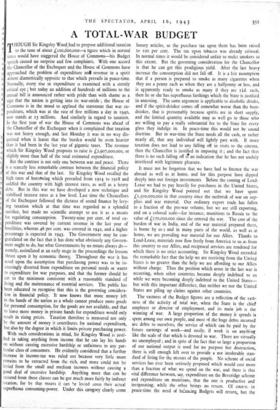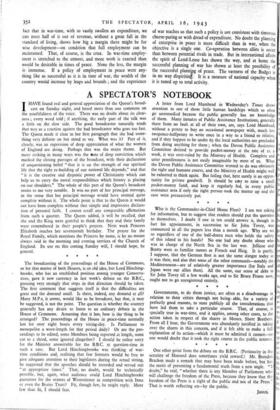A TOTAL-WAR BUDGET
is
a 0 d e
le n ie
y et
THOUGH Sir Kingsley Wood had to propose additional taxation to the tune of about itoo,000,000—a figure which in normal times would have staggered the House of Commons—his Budget speech caused no surprise and few complaints. With one accord the Chancellor of the Exchequer and the House of Commons have approached the problem of expenditure an& revenue in a spirit almost diametrically opposite to that which prevails in peace-time. Normally, every rise in expenditure is examined with a sternly critical eye ; but. today an addition of hundreds of millions to the annual bill is announced rather with pride than with shame as a sign that the nation is getting into its war-stride ; the House of Commons is in the mood to applaud the statement that war ex- penditure, which was at the rate of five millions a day in 1940, now stands at 15 millions. And similarly in regard to taxation. In the first year of war the House of Commons was ahead of the Chancellor of the Exchequer when it complained that taxation was not heavy enough, and last Monday it was in no way dis- quieted when it learnt that the burden would be even heavier than it had been in the last year of gigantic taxes. The revenue which Sir Kingsley Wood proposes to raise is £2,907,000,000, or slightly more than half of the total estimated expenditure.
But the contrast is not only one between war and peace. There is a scarcely less remarkable contrast between the financial policy of this war and that of the last. Sir Kingsley Wood recalled the high rates of borrowing which prevailed from 1914 to 1918 and saddled the country with high interest rates, as well as a heavy debt. But in this war we have developed a new technique and stabilised interest rates at a low level. Last time the Chancellors of the Exchequer followed the dictates of sound finance by levy- ing taxation which at that time was regarded as a splendid sacrifice, but made no scientific attempt to use it as a means for regulating consumption. Twenty-nine per cent. of total ex- penditure was covered by current revenue in the last year of hostilities, whereas 46 per cent. was covered in 1942, and a higher percentage is expected in 1943. The Government may be con- gratulated on the fact that it has done what obviously any Govern- ment ought to do, but what Governments by no means always do— namely, assimilated at an early stage in the proceedings the lessons thrust upon it by economic theory,. Throughout the war it has acted upon the assumption that purchasing power was to be in- creasingly diverted from expenditure on personal needs or wants to expenditure for war purposes, and that the former should be cut to the minimum consistent with a • reasonable standard of living and the maintenance of essential services. The public has been educated to recognise that this is the governing considera- tion in financial policy. it now knows that more money left in the hands of the nation as a whole cannot produce more goods for personal consumption, for the goods are not available, and that to leave more money in private hands for expenditure would only result in rising prices. Taxation therefore is measured not only by the amount of money it contributes for national expenditure, but also by the degree in which it limits private purchasing power.
With such considerations in mind, Sir Kingsley Wood is justi- fied in taking anything from income that be can lay his hands on without causing excessive hardship or unfairness to any par- ticular class of consumers. He evidently considered that a further increase in income-tax was ruled out because very little more remains to be extracted from the rich, and more could not be levied from the small and medium incomes without causing a good deal of excessive hardship. Anything more that can be secured from these classes can be got much more fairly by indirect taxation, for by that means it can be levied unon their actual superfluous consuming-power. Under this category dearly come luxury articles, so the purchase tax upon them has been raised to too per cent. The tax upon tobacco was already colossal. In normal times it would be considered unfair to mulct smokers to this extent. But the governing consideration for the Chancellor is that he can get this prodigious yield. After the last heavy increase the consumption did not tall off. It is a fair assumption that if a person is prepared to smoke as many cigarettes when they are a penny each as when they are a halfpenny or less, and is apparently ready to smoke as many if they are ad. each, then he or she has superfluous farthings which the State is justilied in annexing. The same argument is applicable to alcoholic drinks, and if the spirit-drinker comes off somewhat worse than the beer- drinker, that is presumably because spirits are in short supply, and the limited quantity available may as well go to those who are willing to pay a really substantial fee to the State for every glass they indulge in. In peace-time this would not be sound doctrine. But in war-time the State needs all the cash, or rather nearly all, that any individual will lightly part with. If more taxation does not lead to any falling off in visits to the cinema, then the Chancellor is justified in imposing it ; and the fact that there is no such falling off ir an indication that he has not unduly interfered with legitimate pleasure.
It must not be forgotten that we have had to finance the war abroad as well as at home, and for this purpose have dipped deeply into our foreign investments before the coming of Lend- Lease we had to pay heavily for purchases in the United States, and Sir Kingsley Wood pointed out that we have spent £1,5o0,000,000 in that country since the outbreak of war on sup- plies and war material. Our ordinary export trade has fallen to a fraction of the pre-war volume, but we are still exporting, and on a colossal scale—for instance, munitions to Russia to the value of L170,000,000 since she entered the war. The cost of the burden of war in India, and of the war material prepared there, is borne by us ; and in many parts of the world, as well as at home, we are providing war material for our Allies. Thanks to Lend-Lease, materials now flow freely from America to us as from this country to our Allies, and reciprocal services are rendered for which there is no strict accounting. Sir Kingsley Wood recorded the remarkable fact that the help we are receiving from the United States is no greater than the help we are affording to our Allies without charge. Thus the position which arose in the last war is recurring, when other countries became deeply indebted to us while we were becoming deeply indebted to the United States— but with this important differehce, that neither we nor the United States are piling up claims against other countries.
The vastness of the Budget figures are a reflection of the vast- ness of the activity of total war, when the State is the chief employer or director of employment, and its main job is the winning of war. A large proportion of the money it spends is spent among our own people, and most of the huge debts incurred are debts to ourselves, the service of which can be paid by the future earnings of work—and easily, if work is on anything like the scale of that which is devoted to war. There are virtually no unemployed ; and in spite of the fact that so large a proportion of our national output is used for no purpose but destruction, there is still enough left over to provide a not intolerable stan- dard of living for the masses of the people. No scheme of social services has ever been seriously proposed which would cost more than a fraction of what we spend on the war, and there is this vital difference between, say, expenditure on the Beveridge scheme and expenditure on munitions, that the one is productive and invigorating, while the other brings no return. Of course, in peace-time the need of balancing Budgets will return, but the fact that in war-time, with so vastly swollen an expenditure, we can meet half of it out of revenue, without a great fall in the standard of living, shows how big a margin there might be for wise development—on condition that full employment can be maintained. That, of course, is the crux. In war-time employ- ment is stretched to the utmost, and more work is exacted than would be desirable in times of peace. None the less, the margin is immense. If a policy of employment in peace were any- thing like as successful as it is in time of war, the wealth of the country would increase by leaps and bounds ; and the experience of war teaches us that such a policy is not consistent with timorous cheese-paring or with dread of expenditure. No doubt the planning of enterprise in peace is more difficult than in war, when the objective is a single one. Co-operation between allies is easier than between potential rivals in trade. But in international affairs the spirit of Lend-Lease has shown the way, and at home the successful planning of war has shown at least the possibility of the successful plannikg of peace. The vastness of the Budget is in no way dispiriting. It is a measure of national capacity when it is tuned up to total activity.



























 Previous page
Previous page